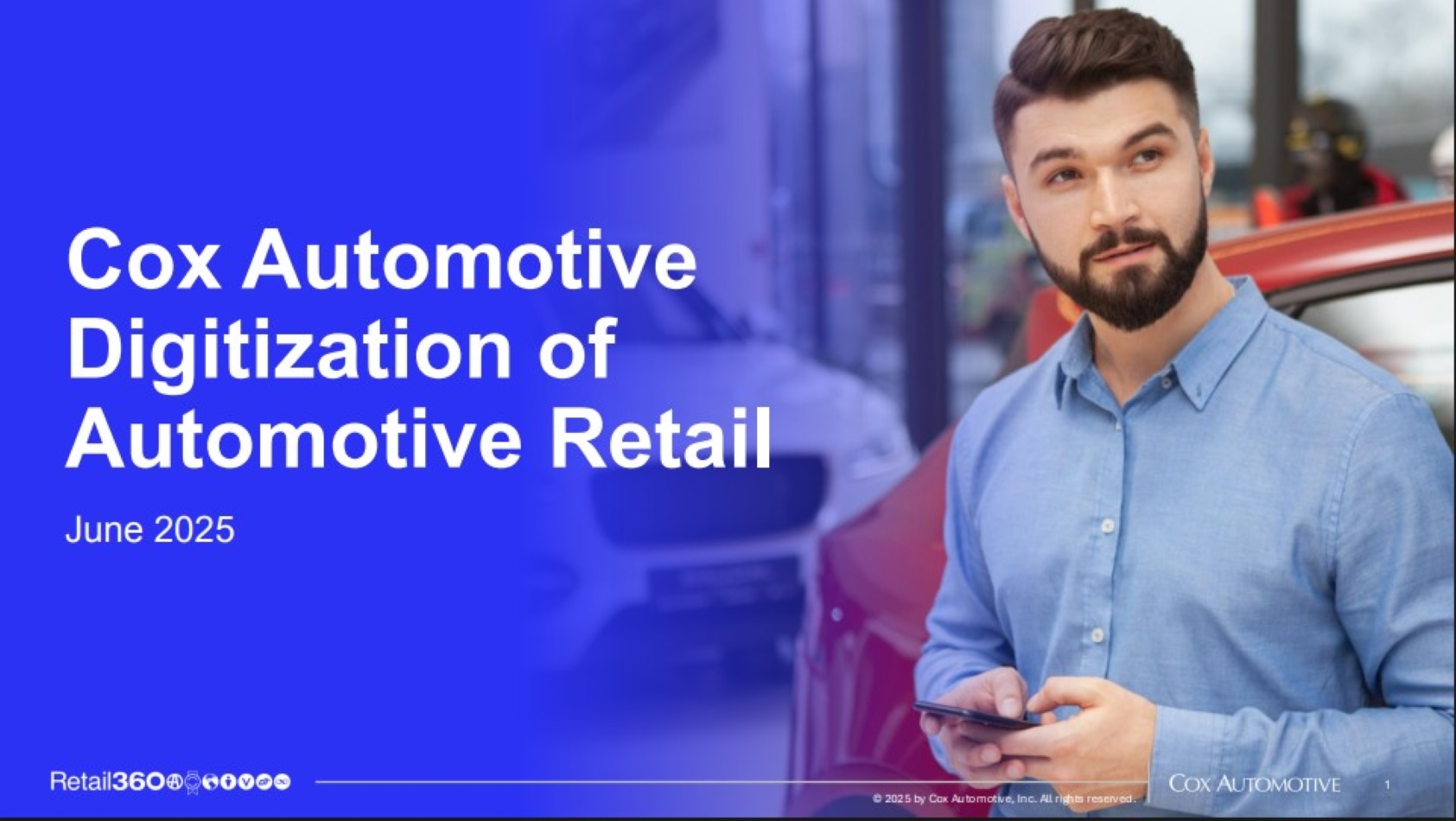Cox study shows gaps in consumer and dealer perceptions of AI, digital retailing

Image courtesy of Cox Automotive.
By subscribing, you agree to receive communications from Auto Remarketing and our partners in accordance with our Privacy Policy. We may share your information with select partners and sponsors who may contact you about their products and services. You may unsubscribe at any time.
Is artificial intelligence the future of auto retailing?
The answer to that question depends on whom you ask.
Cox Automotive’s Digitization of Automotive Retail Study found an enormous gap between what consumers and car dealers believe will happen.
The study, which surveyed 2,193 consumers and 385 franchise dealers, showed 83% of the consumers said the rise of technologies like AI will impact the way they purchase vehicles over the next 10 years, while just 37% of dealers said AI is important to the evolution of dealership operations.
The consumers surveyed included 1,926 car shoppers who plan to purchase in the next 12 months, 926 who responded to the survey within 24 hours of visiting a dealership, 267 of whom bought a car during that visit.
The size of that gap is surprising given that 54% of dealers agreed AI saves time and increases productivity and efficiency. Even so, the study found only a small fraction of the dealers who said they are familiar with AI are actually using it. For example, while 52% said they’re familiar with AI predictive capabilities into consumer online actions and behaviors, just 17% are currently employing them.
Subscribe to Auto Remarketing to stay informed and stay ahead.
By subscribing, you agree to receive communications from Auto Remarketing and our partners in accordance with our Privacy Policy. We may share your information with select partners and sponsors who may contact you about their products and services. You may unsubscribe at any time.
On the consumer side, 57% of consumers who interacted with an AI chatbot said it improved their dealership experience.
While AI adoption might be lagging, the study found dealers increasingly moving toward digital retailing tools and giving their customers options to complete some or all of their purchase online.
According to Cox’s survey, 65% of car shoppers want to conduct some or most of their purchase process online, and dealers have responded to that, with 69% saying customers have influenced their adoption of tools to do that. Over the past three years, the percentage of dealers who said they give customers the ability to complete the entire purchase online has risen from 34% to 43%.
Both dealers and consumers agree online retailing tools improve the car-buying process. About 70% of dealers said they create efficiencies and have a positive effect on customer satisfaction, while about the same percentage of consumers said the tools saved time and enhanced their experience.
“Forcing car buyers down one purchase path is no longer considered a best practice,” Cox Automotive president of retail solutions Lori Wittman said. “Today’s most successful dealers are rethinking the retail journey, creating seamless transitions between online and in-store, powered by automation, clean data and personalization.
“This study reinforces our mission to support dealers in building the omnichannel, customer-first experiences consumers now demand. Opening all paths to purchase and connecting them is even more important in this rising cost environment we’re all facing.”
Still, there remain challenges to offering that omnichannel experience, and gaps in consumer and dealer perceptions.
In the survey, 85% of consumers said they believe beginning their purchase online allows them to seamlessly continue the process where they left off when they get to the dealership. On the other hand, 97% of dealers said customers have to repeat steps they completed online when they get to the store, and 83% said that affects efficiency.
The biggest obstacle preventing the seamless transition from online to in-store is lack of confidence and consistency in the data, with 68% of dealers saying they repeat steps to verify the information customers provided online is accurate.
Overall, though, digital retailing is doing its job. Car buyers who completed most of their purchase online saved an average of 42 minutes in their trip to the dealership and 81% of them said they were highly satisfied with their in-store experience. And 77% of dealers said their digital retailing tools are completely or somewhat effective in meeting their dealership’s goals.
The study results are available here, and Cox Automotive’s ebook, The Omnichannel Dealership, which discusses the study, can be downloaded here.


